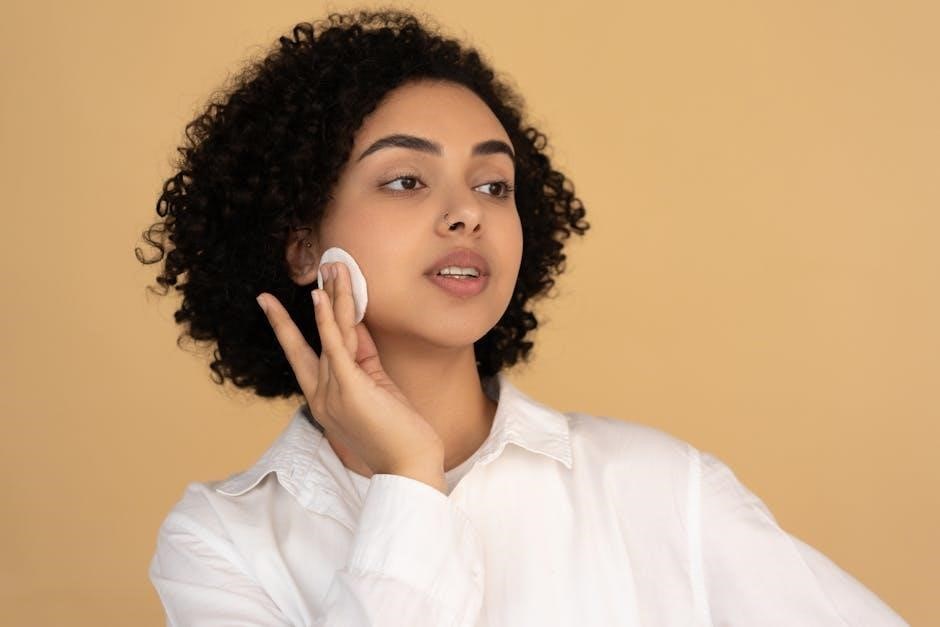
Essential oils are powerful, versatile extracts offering numerous benefits for health, wellness, and daily life. Explore their uses through comprehensive guides and PDF lists, detailing properties and applications.
What Are Essential Oils?
Essential oils are concentrated plant extracts derived from various parts of plants, such as leaves, flowers, roots, and bark. They capture the natural scent and therapeutic properties of the plants, making them highly potent. These oils are often used in aromatherapy, skincare, and natural remedies due to their versatility. Unlike perfume oils, essential oils are not blended for fragrance alone but are valued for their potential health benefits and emotional well-being. They are typically obtained through steam distillation or cold pressing, ensuring their natural essence is preserved.
The Importance of Essential Oils
Essential oils are highly valued for their versatility and natural benefits, offering solutions for health, wellness, and household needs. They are used in aromatherapy to promote mental clarity and emotional balance, while their therapeutic properties support physical health. Many essential oils have antimicrobial and anti-inflammatory qualities, making them popular for natural remedies. Additionally, they are eco-friendly and sustainable, serving as a chemical-free alternative for cleaning and skincare. Their ability to enhance well-being and provide natural solutions has made them a cornerstone in holistic living, appealing to those seeking healthier lifestyles.
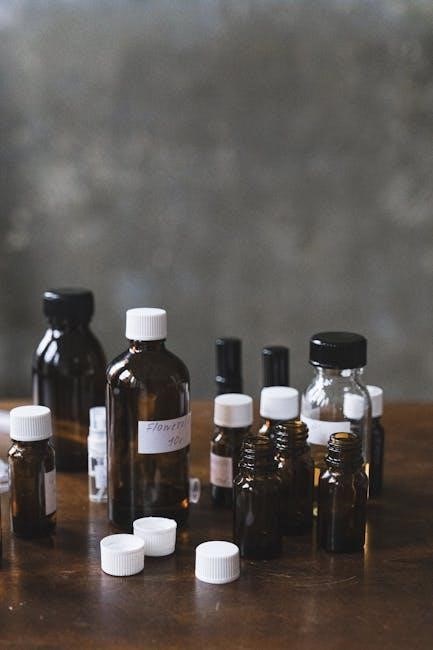
Comprehensive List of Essential Oils and Their Uses
This section provides a detailed guide to essential oils, including their properties, benefits, and applications. From lavender to peppermint, discover how each oil can enhance your life naturally.
Common Essential Oils and Their Benefits
Lavender oil is renowned for its calming effects, promoting relaxation and improving sleep quality. Tea tree oil, known for its antimicrobial properties, is ideal for skincare and wound healing. Peppermint oil boosts energy and alleviates digestive issues, while eucalyptus oil is excellent for respiratory relief. Frankincense oil reduces inflammation and stress, and chamomile oil soothes anxiety and irritability. These oils are versatile, offering natural solutions for health, wellness, and daily routines. Their benefits make them indispensable in aromatherapy and holistic care.
Less Common Essential Oils and Their Applications
Juniper berry oil is valued for its detoxifying properties and is often used in natural cleansing rituals. Myrrh oil, known for its earthy scent, is prized for its anti-inflammatory benefits and skin-healing properties. Sandalwood oil, while expensive, is a potent tool for emotional well-being and grounding. These lesser-known oils offer unique advantages, from spiritual practices to skincare, making them worthwhile additions to any essential oil collection. Their versatility ensures they cater to diverse needs, enhancing both physical and mental health.
Kid-Safe Essential Oils
Lavender oil is a gentle, kid-friendly option for promoting relaxation and calming emotions. Chamomile oil is another safe choice, often used to soothe restlessness and improve sleep quality. Bergamot oil, with its uplifting scent, can help reduce anxiety in children. Ylang-ylang oil is also suitable for kids, offering a sweet, calming fragrance. Always dilute essential oils with a carrier oil and perform a patch test before use. These oils provide a natural way to support children’s emotional and physical well-being when used responsibly.
Safety Guidelines for Using Essential Oils
Always dilute essential oils with a carrier oil before skin application. Perform a patch test to check for allergies. Avoid photosensitive oils before sunlight exposure.
Precautions for Essential Oil Use
Essential oils are highly potent, so always dilute them with a carrier oil before skin application. Perform a patch test to check for allergic reactions. Avoid applying photosensitive oils before sun exposure. Consult a healthcare professional before using essential oils, especially if pregnant, breastfeeding, or with medical conditions. Keep oils out of reach of children and pets. Ensure you use high-quality, pure oils from reputable sources to minimize risks and maximize benefits. Follow recommended dilution ratios and usage guidelines for safe and effective results.
Photosensitizing Essential Oils
Certain essential oils, like bergamot, lemon, and grapefruit, contain compounds that can cause skin sensitivity to sunlight. These photosensitizing oils may lead to sunburn or skin discoloration if applied before UV exposure. Always use them responsibly and avoid direct sun exposure for at least 12 hours after application. Dilute properly and consult a guide to identify such oils. Prioritize safety to enjoy their benefits without risks.
Carrier Oils: Their Role and Importance
Carrier oils dilute essential oils, enhancing absorption and reducing irritation. They protect the skin and are vital for safe essential oil use in aromatherapy and skincare blends.
Popular Carrier Oils
Coconut, jojoba, and sweet almond oils are widely used due to their nourishing properties. Coconut oil is lightweight and absorbs quickly, while jojoba closely resembles skin’s natural sebum. Sweet almond oil is rich in vitamins, making it ideal for sensitive skin. Other popular options include argan, grapeseed, and rosehip oils, each offering unique benefits for different skin types and needs. These carrier oils are essential for diluting essential oils, ensuring safe and effective application in skincare and aromatherapy blends.
Benefits of Carrier Oils for Skin
Carrier oils like coconut, jojoba, and sweet almond oil offer exceptional skin benefits. Coconut oil moisturizes deeply and soothes irritated skin, while jojoba oil balances skin pH and reduces inflammation. Sweet almond oil, rich in vitamins, enhances skin elasticity and hydration. These oils are gentle, non-greasy, and suitable for all skin types, making them ideal for blending with essential oils in skincare routines. They protect, nourish, and rejuvenate the skin, promoting a healthy and glowing complexion when used regularly in aromatherapy and natural beauty treatments.
Essential Oil Blending: Tips and Tricks
Essential oil blending involves combining oils for synergistic effects. Start with a base note, add middle notes, and finish with top notes for balanced scents. Always dilute safely using carrier oils and consult dilution charts to ensure proper ratios. Experiment with small batches and keep a journal to track your creations. Printable PDF guides and blending charts can help you master the art of blending for therapeutic and aromatic benefits.
How to Create Custom Blends
Creating custom essential oil blends involves combining oils to achieve desired therapeutic or aromatic effects. Start by selecting a base note oil, like frankincense or cedarwood, for depth. Add middle notes, such as lavender or geranium, for balance. Finish with top notes, like peppermint or citrus, for freshness. Use a dilution chart to ensure safe concentrations and consult a list of essential oils for their specific properties. Test small batches on the skin and adjust as needed for personal preference. Always document your recipes for future reference.
Top Essential Oil Combinations
Popular essential oil combinations include the Stress Relief Blend (lavender, bergamot, and frankincense) for calmness and the Immunity Boost (lemon, eucalyptus, and rosemary) for respiratory support. The Energy Uplift blend combines peppermint, grapefruit, and cinnamon for mental clarity. For relaxation, try the Tranquil Sleep mix of chamomile, sandalwood, and ylang-ylang. Always refer to a dilution chart and test blends on a small area before use. These combinations are versatile and can be adapted to personal preferences for maximum benefits.

Essential Oils for Health and Wellness
Essential oils like lavender, peppermint, and eucalyptus offer natural solutions for various health concerns. They can alleviate stress, boost energy, and support respiratory health when used properly.
Essential Oils for Stress Relief
Essential oils like lavender, chamomile, and bergamot are renowned for their calming properties. Lavender oil promotes relaxation and reduces anxiety, while chamomile soothes emotional tension. Bergamot oil uplifts the mood and alleviates stress. These oils can be used in diffusers, massages, or inhalation. Regular use helps create a peaceful environment, combating daily stress and fostering mental well-being. Incorporating these oils into your routine can provide natural and effective relief from stress-related issues, enhancing overall emotional balance and resilience.
Essential Oils for Pain Management
Essential oils like peppermint, eucalyptus, frankincense, and wintergreen are highly effective for pain relief. Peppermint oil reduces inflammation and eases muscle tension, while eucalyptus oil provides a cooling sensation to soothe aches. Frankincense oil has anti-inflammatory properties, aiding in joint pain relief, and wintergreen oil contains methyl salicylate, which alleviates muscle spasms and arthritis. These oils can be applied topically with carrier oils or inhaled for rapid relief. They offer a natural alternative to conventional pain management, promoting comfort and well-being without harsh side effects.
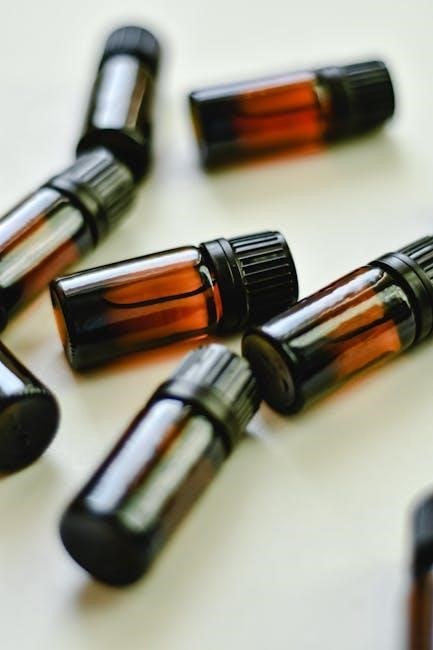
Essential Oils for Aromatherapy
Essential oils like lavender, eucalyptus, and frankincense are popular in aromatherapy for relaxation, mood enhancement, and stress relief. They promote emotional balance and overall well-being when diffused or inhaled.
Best Oils for Aromatherapy
Lavender, eucalyptus, and frankincense are among the best oils for aromatherapy, offering relaxation, decongestant properties, and mood enhancement. Bergamot and ylang-ylang reduce anxiety, while lemon and peppermint boost energy and mental clarity. Sandalwood and chamomile promote grounding and improve sleep quality. These oils are versatile, suitable for diffusion, direct inhalation, or blending, making them ideal for addressing various emotional and physical needs in aromatherapy practices.
How to Use Essential Oils in Aromatherapy
To use essential oils in aromatherapy, start by diffusing them in water or inhaling directly from a cloth or handkerchief. Add a few drops to warm bath water for relaxation or mix with carrier oils for topical application. Blending oils can enhance their therapeutic effects, while dilution charts ensure safe usage. Always consult a guide to determine the right concentration and method for your specific needs, whether for relaxation, energy, or emotional balance.
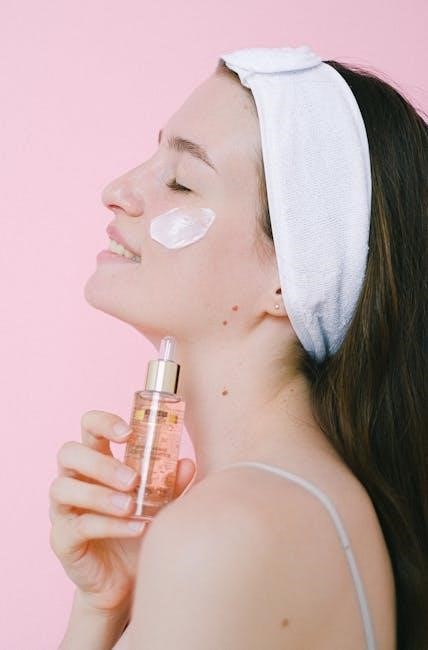
Essential Oils for Skincare
Essential oils like lavender, frankincense, and tea tree oil are popular for their skin benefits, from calming irritation to combating acne. Chamomile and geranium oils soothe and balance sensitive skin.
Oils for Different Skin Types
Essential oils cater to various skin types, offering tailored benefits. For oily skin, tea tree oil reduces acne and controls sebum, while geranium balances hormones. Dry skin benefits from frankincense, which boosts collagen and hydration. Sensitive skin finds relief with chamomile, known for its calming properties. Bergamot oil, rich in antioxidants, helps combination skin by purifying and toning; Each oil addresses specific needs, making them versatile for personalized skincare routines.
DIY Skin Care Recipes
Create personalized skin care products using essential oils tailored to your needs. For a soothing facial cream, mix frankincense oil with coconut oil and shea butter to reduce fine lines and promote collagen production. Alternatively, combine lavender oil with jojoba oil for a calming serum that hydrates and balances sensitive skin. To tackle acne, blend tea tree oil with aloe vera gel for its antibacterial properties. These DIY recipes offer natural, effective solutions for various skin concerns, empowering you to craft custom care routines at home.
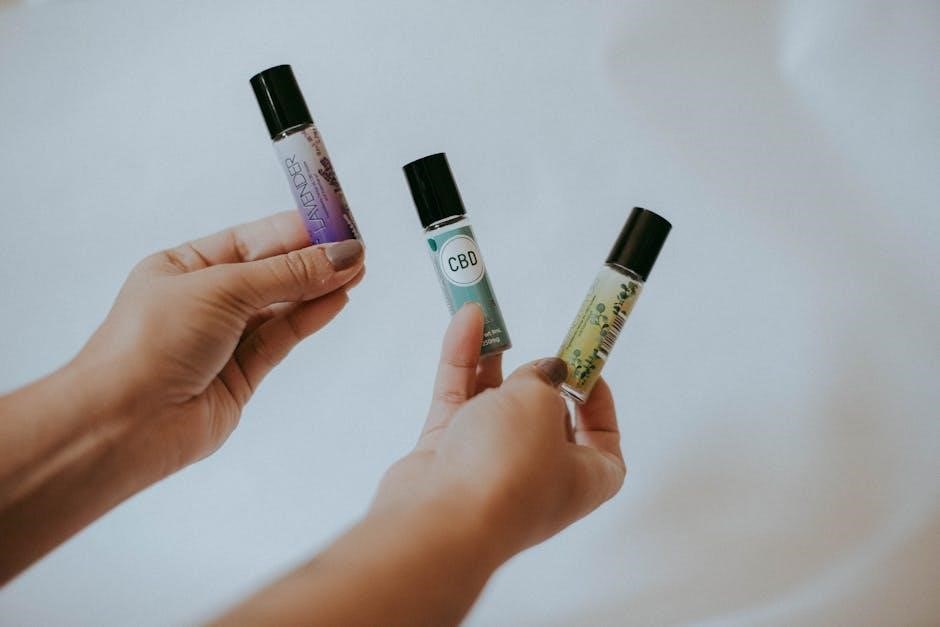
Essential Oils for Household Use
Essential oils are versatile for cleaning and freshening homes naturally. Use lemon oil for surfaces, tea tree oil for disinfecting, and peppermint oil to repel pests. Safe and effective!
Natural Cleaning with Essential Oils
Essential oils offer a natural, effective way to clean and freshen your home. Lemon oil is great for disinfecting surfaces, while tea tree oil provides antimicrobial properties. Eucalyptus oil freshens the air and repels pests. Mix a few drops of your chosen oil with water or vinegar for an eco-friendly cleaner. These oils are non-toxic and biodegradable, making them perfect for families and the environment. DIY recipes using essential oils can replace harsh chemicals, ensuring a safer, fresher home.
Pest Control Using Essential Oils
Essential oils are a natural and effective way to repel pests without harmful chemicals. Peppermint oil deters ants and mice, while lemongrass oil repels mosquitoes. Tea tree oil targets insects like mites and fleas. Mix a few drops of your chosen oil with water or carrier oil and spray it around entry points or directly on surfaces. These oils are safe for indoor use and can be combined for enhanced efficacy. DIY pest control blends are eco-friendly and provide long-lasting results, keeping your home pest-free naturally.
Essential Oils for Emotional Well-being
Essential oils like lavender, sandalwood, and bergamot enhance mood and emotional balance. They provide natural support for mental clarity, relaxation, and uplifting moods, promoting overall well-being.
Oils for Mood Enhancement
Essential oils like orange, lemon, and peppermint uplift spirits with their refreshing scents. Bergamot and frankincense promote emotional balance, while ylang-ylang fosters calm. Geranium and rosemary enhance focus and positivity, making them ideal for improving mental clarity. These oils are widely used in aromatherapy to naturally elevate moods and reduce stress, offering a holistic approach to emotional well-being. Always dilute and use safely to maximize their benefits for mood enhancement.
Essential Oils for Anxiety and Depression
Essential oils like lavender and chamomile are renowned for their calming effects, helping to alleviate anxiety and depression. Frankincense reduces anxiety and promotes relaxation, while ylang-ylang eases emotional stress. Bergamot’s citrus scent uplifts the mind, combating depression. These oils can be diffused or applied topically (when diluted) to provide comfort and emotional balance. Always consult a professional before use, especially for severe conditions, to ensure safe and effective results.

Frequently Asked Questions About Essential Oils
Discover answers to common questions about essential oils, such as their safety during pregnancy, usage on pets, and benefits for health and wellness.
Are Essential Oils SafeDuring Pregnancy?
Essential oils can be beneficial during pregnancy, but caution is advised. Some oils, like clary sage and rosemary, should be avoided due to their potential to stimulate the uterus. Always consult a healthcare provider before using essential oils while pregnant. Certain oils, such as lavender and frankincense, are generally considered safe and may help with relaxation and mood support. Ensure you use high-quality, pure oils and follow proper dilution guidelines to minimize risks.
Can Essential Oils Be Used on Pets?
Essential oils can be used on pets, but with extreme caution. Some oils, like lavender, are generally safe and may help with anxiety or skin issues. However, others, such as tea tree oil, can be toxic to pets. Always dilute oils heavily and consult a veterinarian before use. Pets metabolize oils differently than humans, so even small amounts can be harmful. Research thoroughly and choose high-quality oils to ensure safety and effectiveness for your furry friends;
DIY Recipes Using Essential Oils
Create natural homemade products with essential oils, from cleaning solutions to skincare. Explore recipes for diffusers, candles, and beauty treatments, enhancing your lifestyle sustainably.
Homemade Cleaning Products
Essential oils are perfect for creating natural, eco-friendly cleaning solutions. Mix oils like lemon, tea tree, and lavender with water and vinegar for effective all-purpose cleaners. These blends not only disinfect but also leave a fresh, pleasant scent. For tougher tasks, combine eucalyptus or peppermint oils with baking soda for scrubbing powders. Essential oils are cost-effective and customizable, allowing you to tailor cleaning products to your needs while avoiding harsh chemicals. Use carrier oils to dilute and enhance their cleaning properties safely.
Natural Beauty Products
Essential oils are a cornerstone in natural beauty care, offering tailored solutions for skin and hair. Oils like lavender and chamomile soothe sensitive skin, while frankincense and geranium promote anti-aging benefits. Carrier oils, such as jojoba and coconut oil, enhance these blends, providing hydration and nourishment. Use rosemary oil for hair growth or tea tree oil for acne treatment. These natural ingredients allow you to create personalized beauty products free from harsh chemicals, ensuring healthy and radiant results for all skin types and needs.
How to Choose the Right Essential Oils
Selecting the right essential oils involves prioritizing purity, sourcing from reputable brands, and understanding the plant origin. Always opt for high-quality oils tailored to your specific needs.
Understanding Oil Quality
Ensuring high-quality essential oils is crucial for their effectiveness and safety. Look for oils that are 100% pure, free from additives, and extracted using sustainable methods. Reputable brands often provide third-party testing results to verify purity. Understanding the oil’s botanical origin and extraction process can also impact its quality and potency. Always prioritize oils that align with your specific needs, whether for therapeutic, aromatic, or skincare purposes. Quality directly affects the benefits you can derive from using essential oils.
Where to Buy Essential Oils
Purchasing high-quality essential oils requires selecting reputable sources. Look for brands like doTERRA, Young Living, or Mountain Rose Herbs, known for their commitment to purity and sustainability. Online marketplaces such as Amazon and Etsy offer a wide range of options, often with customer reviews to guide your choice. Local health stores and specialty shops also provide excellent selections. Always check for certifications like GC/MS testing to ensure authenticity. Buying directly from distilleries or trusted suppliers guarantees freshness and transparency in the production process.

Creating a Printable Essential Oil List
Organize essential oils alphabetically in a PDF guide, detailing their properties, benefits, and uses. Use templates for clarity, ensuring easy reference and practical application.
How to Make a PDF Guide
To create a printable essential oil guide, start by categorizing oils alphabetically or by their properties. Include names, benefits, and uses, along with safety tips and dilution charts. Use templates for a clean layout, ensuring readability. Add visuals like charts or icons to enhance understanding. Export the document as a PDF and share it for easy access. This format allows users to reference the guide anytime, making it a practical tool for both beginners and experienced essential oil enthusiasts.
Organizing Your Essential Oil Collection
Organizing your essential oils enhances accessibility and safety. Start by listing each oil, noting its name, category, and primary uses. Store them in a cool, dark place to preserve quality. Use labels with key information like name, use, and precautions. Group oils by function—relaxation, energy, skincare—and keep kid-safe oils separate. Consider a dilution chart for safe blending. Utilize baskets or trays for visual grouping. Explore digital tools for inventory management, but begin with a physical system for simplicity and efficiency.
Essential oils offer endless possibilities for health, wellness, and daily life. With proper knowledge and organization, you can harness their power effectively. Explore further and enjoy their benefits!
Final Thoughts on Essential Oils
Essential oils are a natural treasure, offering countless benefits for health, skincare, and emotional well-being. Their versatility makes them a valuable addition to any lifestyle. Always choose high-quality oils from reputable sources to ensure safety and effectiveness. Whether you’re using them for relaxation, cleaning, or skincare, essential oils provide a holistic approach to wellness. By exploring their diverse uses and applications, you can unlock their full potential and enhance your daily life in meaningful ways. Embrace the natural power of essential oils and discover their transformative benefits.
Encouragement to Explore Further
Take the next step in your essential oil journey by diving deeper into their world. With countless resources like PDF guides and comprehensive lists, you can uncover their full potential. From blending techniques to safety tips, there’s always more to learn. Experiment with new oils, try DIY recipes, and explore how they can enhance your health and home. Let curiosity guide you as you discover the endless possibilities essential oils offer for a natural, balanced lifestyle.




